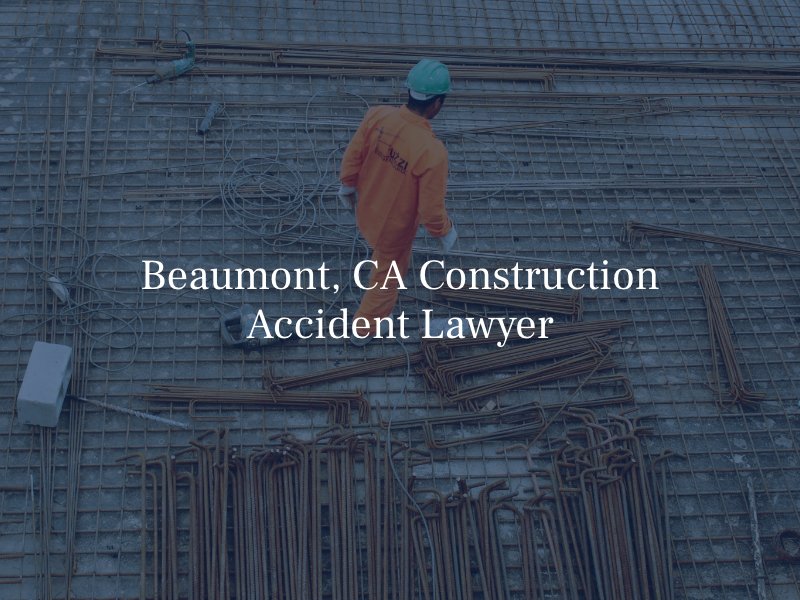
Beaumont, CA Construction Accident Attorney
CLICK FOR FREE CONSULTATIONFrom falls and equipment malfunctions to exposure to toxic materials, construction sites present numerous risks. If you’ve been injured in a construction accident, you need a skilled Beaumont injury attorney who understands the complexities of these cases and can fight for your rights. Contact Hanson & Mouri to arrange a free consultation today.

Why Choose Our Beaumont Construction Accident Attorney?
At Hanson & Mouri, we specialize in representing construction workers who have been injured on the job. Our experienced lawyer is dedicated to helping you navigate the legal process and secure the compensation you deserve. We have a deep understanding of federal and state safety regulations, workers’ compensation laws, and personal injury claims specific to the construction industry.
- Each case is unique. We develop tailored legal strategies that align with your specific circumstances and goals.
- Our goal is to ensure you receive the maximum compensation for medical expenses, lost wages, pain and suffering, and any long-term impacts on your quality of life.
- We work on a contingency fee basis, meaning you don’t pay unless we win your case.
How Can a Construction Accident Attorney Help?
Construction accidents can result in devastating and life-changing injuries, causing extreme financial distress for you and your family due to medical bills, lost income not covered by workers’ compensation, and other losses. During the workers’ compensation claims process, your employer’s insurance company might not offer benefits that truly reflect the extent of your injuries. To protect your interests, an attorney can manage every aspect of your claim, particularly if it is unfairly denied. They will work to ensure you receive the full compensation you need and deserve.
A Beaumont construction accident lawyer will also thoroughly investigate your accident to determine if a third party, such as a contractor or property owner, contributed to your injury. If a third party is involved, your attorney can help you pursue a claim for additional compensation beyond workers’ comp benefits.
Common Types of Construction Accidents
Construction sites are inherently dangerous, and some common types of construction accidents include:
- Falls: Slip and falls are one of the leading causes of construction-related injuries and deaths. They can occur from heights such as ladders, scaffolding, roofs, or elevated work platforms.
- Struck-by accidents: These accidents occur when workers are struck by falling or moving objects such as tools, equipment, or materials. This can happen when materials are not properly secured or when workers are in close proximity to moving machinery.
- Electrical accidents: Workers can come into contact with live wires, faulty electrical systems, or improperly grounded equipment. Electrical accidents can cause severe burns, electrocution, and even death.
- Caught-in/between accidents: These accidents occur when a worker is caught or crushed between two objects or is caught in machinery or equipment. Workers can suffer severe injuries, including amputations and death.
- Respiratory illnesses: Workers may develop respiratory problems such as lung cancer, silicosis, and other respiratory diseases due to exposure to dust, fumes, and hazardous chemicals.
- Trench collapses: Workers in trenches or excavations can be buried alive if the walls of the trench or excavation collapse, causing suffocation, asphyxiation, or crushing injuries.
These types of construction accidents can be fatal. If you have lost a loved one due to a construction accident, our Beaumont wrongful death lawyer can help.
What are Common Injuries Associated With Construction Accidents?
Construction accidents can result in catastrophic injuries, such as the following:
Traumatic Brain Injury
A traumatic brain injury (TBI) can range from mild to severe. However, even a minor TBI or concussion can have long-term consequences. In extreme cases, victims can suffer permanent cognitive or physical impairment.
Scarring and Disfigurement
Lacerations or burns can occur—for example, due to explosions, broken glass, tools, sharp metal, plastic parts, vehicle fire, etc. A severe laceration or burn can cause long-term damage and may result in significant scarring that diminishes a victim’s ability to enjoy life.
Severe Bone Fractures
Broken arms, legs, ribs, and pelvis breaks are common in construction accidents. They may take weeks to heal, and activities are typically restricted.
Internal Bleeding
Damage to internal organs can be life-threatening if not treated immediately after an accident.
Back Injuries
Back injuries of all types can occur, such as herniated or bulging discs, fractures, spinal cord injuries, paralysis, and more. These injuries often result in lifelong complications and chronic pain.
Crush Injuries and Limb Amputations
A construction accident can result in a crushed limb or digits, causing damage that is so severe that it leads to amputation.
Post-Traumatic Stress Disorder
The trauma from a construction accident can lead to severe mental and emotional conditions that are debilitating.
Exposure to Hazardous Substances
A construction worker can become ill due to frequent or prolonged inhalation of contaminants, such as chemicals, mold, asbestos, wood dust, etc.
Wrongful Death
Some construction accidents result in fatal injuries to the victim.
Who Is Responsible for a Construction Accident?
Construction workers cannot sue employers for an accident as long as they carry workers’ compensation insurance and do not intentionally cause you harm. However, when a third party partially or entirely caused your injury, you can pursue a personal injury claim for compensation beyond what workers’ comp covers. Examples of third parties that may be liable for a construction zone accident include:
A General Contractor, Construction Manager, or Subcontractor: These parties are required by law to provide workers with reasonably safe construction sites and warn of any hazards.
Property Owners: Property owners have a duty to keep the premises reasonably safe for construction workers hired to work on the property by fixing or warning of known hazards or ones they should have known about.
Design Professional: Professionals such as engineers or architects can be legally liable if their design plans for what is being constructed were defective and failed to meet safety standards, resulting in injury.
Product Manufacturers and Suppliers: If defective equipment, tools, or materials contributed to your accident, the faulty product’s manufacturer and any other party involved in its distribution chain may be liable.
Contact Us Today
If you or a loved one has been injured in a construction accident, contact our lawyer at Hanson & Mouri today for a free consultation. Let us handle the legal complexities while you focus on your recovery.